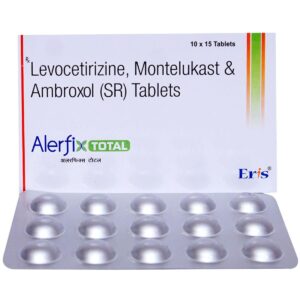AMBROXOL + MONTELUKAST + LEVOCETIRIZINE
Ambroxol: Ambroxol is a medication commonly used as a mucolytic agent. It is primarily prescribed to help with respiratory conditions such as asthma, chronic bronchitis, and emphysema.
The main mechanism of action of Ambroxol is its ability to thin and loosen mucus in the airways, making it easier to cough up and expel. It works by stimulating the production and secretion of surfactant in the lungs, which reduces the viscosity of the mucus and enhances its clearance.
The usual recommended dose of Ambroxol for adults is 30 mg to 60 mg, taken 2 to 3 times daily. For children, the dosage depends on their age and weight, and a doctor should be consulted for appropriate dosing instructions.
While Ambroxol is generally well-tolerated, it may still cause some side effects. Common side effects include nausea, vomiting, diarrhea, stomach pain, and a taste disorder. These side effects are usually mild and temporary, and they typically subside with continued use. In rare cases, more serious adverse reactions may occur, such as allergic reactions, skin rashes, and difficulty breathing. If any severe side effects are experienced, medical attention should be sought immediately.
It is important to note that Ambroxol should only be used as directed by a healthcare professional. It should not be used as a substitute for proper medical treatment, and any underlying conditions should be thoroughly evaluated and diagnosed by a doctor.
Montelukast: Montelukast is a medication commonly known by its brand name, Singulair. It is primarily prescribed for the treatment of asthma and seasonal allergies. Montelukast belongs to a class of drugs called leukotriene receptor antagonists.
The mechanism of action of Montelukast involves blocking the action of leukotrienes, which are substances in the body that cause inflammation and constriction in the airways. By inhibiting leukotrienes, Montelukast helps to reduce inflammation, relax the airway muscles, and prevent wheezing, coughing, and shortness of breath.
The typical recommended dose of Montelukast for adults and adolescents aged 15 years and older is 10mg once daily. For children aged 6 to 14 years, the recommended dose is 5mg once daily. Montelukast should be taken consistently, even when symptoms are not present.
Common side effects of Montelukast may include headache, upset stomach, diarrhea, and rash. In rare cases, serious side effects such as mood or behavior changes, allergic reactions, and liver problems may occur. It is important to note that Montelukast has been associated with a small increased risk of psychiatric events, including suicidal thoughts and behavior, especially in children and adolescents.
Montelukast should be used as directed by a healthcare professional and should not be used to treat acute asthma attacks or allergic reactions. Patients should seek immediate medical attention if they experience worsening respiratory symptoms or other severe side effects while taking Montelukast.
Levocetirizine: Levocetirizine is an antihistamine drug that is commonly used to relieve allergic symptoms such as sneezing, runny nose, itching, and watery eyes. It is primarily used to treat seasonal allergies like hay fever, as well as allergic reactions to substances such as dust mites, pet dander, and mold.
The mechanism of action of Levocetirizine involves blocking the effects of histamine, which is a natural substance produced by the body during an allergic reaction. By blocking the histamine receptors, Levocetirizine helps to reduce the symptoms caused by the release of histamine, providing relief from allergies.
The standard recommended dose of Levocetirizine for adults and children over 12 years old is 5 mg once daily. For children aged 6 to 11 years, the dose is usually 2.5 mg once daily. However, the dosing may vary depending on the individual’s age, weight, and severity of symptoms, so it’s important to follow the instructions provided by a healthcare professional or as stated on the packaging.
While generally well-tolerated, Levocetirizine may cause some side effects, although they are usually mild. Common side effects may include drowsiness, headache, dry mouth, fatigue, dizziness, and gastrointestinal symptoms like nausea and diarrhea. Rarely, more serious side effects such as allergic reactions, difficulty urinating, and liver problems may occur, and immediate medical attention should be sought if any of these occur.
It is important to note that Levocetirizine can interact with certain medications, so it is advisable to inform the healthcare provider about any other medications being taken to avoid any potential interactions.
As with any medication, it is recommended to discuss with a healthcare professional before starting Levocetirizine to ensure it is safe and appropriate for the individual’s specific condition and medical history.

